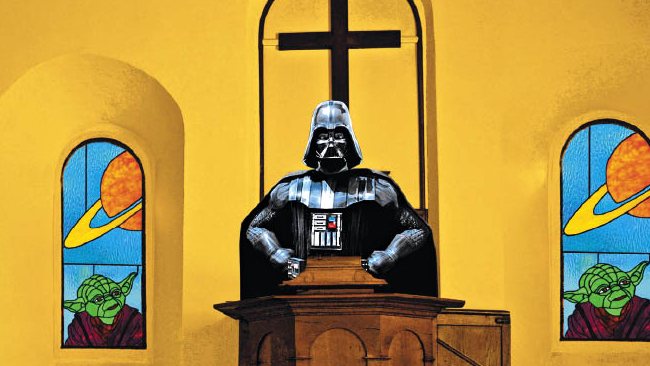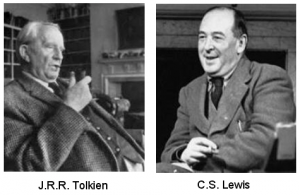 In a recent post I commented on an Australian news item that went global, along with a certain level of controversy, as Pastor Avril Hannah-Jones combined her love for science fiction and fantasy with a service in her local church. Now that the controversy has died down, and her busy Easter service is behind her, Pastor Hannah-Jones discusses science fiction, fantasy, and The Church of Latter-Day Geeks with TheoFantastique.
In a recent post I commented on an Australian news item that went global, along with a certain level of controversy, as Pastor Avril Hannah-Jones combined her love for science fiction and fantasy with a service in her local church. Now that the controversy has died down, and her busy Easter service is behind her, Pastor Hannah-Jones discusses science fiction, fantasy, and The Church of Latter-Day Geeks with TheoFantastique.
TheoFantastique: Avril, how did you come to a personal interest in science fiction and fantasy, and what expressions of them are most appealing to you and why?
Avril Hannah-Jones: It all began for me when a school teacher gave me a copy of The Hobbit when I was about eight. I remember that as the moment when I discovered science fiction and fantasy – but since I was born in the early seventies I’d also seen Star Wars when it was first released, and at some point I’d read C. S. Lewis’ Narnia series. Growing up I enjoyed very (stereo)-typical genre fiction by authors like Marion Zimmer Bradley, Mary Stewart, Judith Tarr and David Eddings.
For a long time my interest was purely book-based; it wasn’t until Joss Whedon’s Buffy series that I really became obsessed with television-based fantasy. I try to limit myself to one television obsession at a time, so at the moment it’s Supernatural (with occasional forays into Doctor Who and Torchwood) and I’m trying to resist the friends who tell me I must watch True Blood.
Usually I read and watch stories that either explore and challenge gender stereotypes or ponder the nature of good and evil. Occasionally, as with Joss Whedon’s television series, I find something that does both.
TheoFantastique: How do you see or make a connection between the sacred and the fantastic, more specifically, between a Christian spirituality and theology and the fantastic?
 Avril Hannah-Jones: I draw very heavily on the thoughts of The Inklings, the Oxford-based group that included C.S. Lewis, J. R. R. Tolkien and Charles Williams. They were all very committed Christians who saw the fantastic as a way of exploring theological themes. Lewis was much more allegorical about it than Tolkien and Williams, but all of them were exploring good and evil and questions about the best way to live.
Avril Hannah-Jones: I draw very heavily on the thoughts of The Inklings, the Oxford-based group that included C.S. Lewis, J. R. R. Tolkien and Charles Williams. They were all very committed Christians who saw the fantastic as a way of exploring theological themes. Lewis was much more allegorical about it than Tolkien and Williams, but all of them were exploring good and evil and questions about the best way to live.
Tolkien also argued that the sort of “world-building” that authors of the fantastic do is a form of “sub-creation” that is part of being human, because humans are made in the image of God the Creator.
Sci-fi and fantasy are often accused of being forms of escapism, as opposed to more serious works, partly because they do often involve the ultimate triumph of good over evil. For me that triumph is at the heart of the Christian story, with the resurrection following the crucifixion, and the sort of fantasy and sci fi that I enjoy most reflects an affirmation by Archbishop Desmond Tutu: Goodness is stronger than evil; love is stronger than hate; light is stronger than darkness; life is stronger than death; victory is ours through him who loves us.
TheoFantastique: At some point you decided to incorporate the fantastic into your church services among your congregation. How did this decision come about? What types of things did you do? And what was the response of the congregation as well as those outside the church?
Avril Hannah-Jones: It started as a joke! I was in the audience of a television program called Adam Hills in Gordon Street Tonight hosted by the very charming Australian comedian Adam Hills. One of the things that he did was get the audience to fill out surveys before coming to the taping, and to the question: “What is your guilty pleasure in life?” I answered: “Sci-fi television. I thanked Buffy the Vampire Slayer in my thesis acknowledgments.”
Adam and his writers thought that that was so funny, given my day job as a Uniting Church minister, that they created an ad for something they called The Church of Latter Day Geeks. Adam then got me to agree to wear a ‘geeky’ t-shirt to lead a worship service, which I did, and finally challenged me to get an entire congregation to dress up.
Since I’d already been thinking about using sci-fi and fantasy to explore theological themes for years, I agreed, and held what I called a “sci-fi and fantasy-friendly church service”. AHIGST promoted it and came along to film an item about it.
Before the service was held I explained to my four congregations what I was doing and why I believed that this particular genre could be used to explore Christian theology. As I told them: “I don’t just watch and read sci fi and fantasy books, films, comics and television programs. I analyse them and theologise about them. My library is full of books with titles like Holy Superheroes! Exploring the Sacred in Comics, Graphic Novels and Film and The Gospel according to Tolkien: Visions of the Kingdom in Middle-Earth and Hogwarts for Muggles: Harry Potter and Philosophy. I’ve even had a chapter on “Good and Evil in the World of Supernatural” published in a collection of essays on the television show Supernatural. Once they knew that there was something seriously spiritual behind the idea of the service their response was overwhelmingly positive.
I advertised the service by saying:
Impressed with the way the Doctor, Buffy the Vampire Slayer and Harry Potter live out Jesus’ teaching, “No one has greater love than this, to lay down one’s life for one’s friends”?
Intrigued by the themes of mercy, forgiveness and redemption in Lord of the Rings, Star Wars and the television series Angel?
Inspired to do good and resist evil by the example of Peter Parker, the crew of Serenity and the Winchester brothers?
Then come to a sci-fi and fantasy-friendly church service to be held at Romsey Uniting Church on the 10th of April at 4 pm.
(You’re welcome to come in a costume of your choice, but blasters, stakes and other weapons will have to be left at the church door.)
TheoFantastique: Has any of the reactions you’ve received surprised you, whether positively or negatively?
Avril Hannah-Jones: I found the fact that the story went global absolutely astounding! Every time I do something a little bit different in the churches, I let the local media know. So I emailed the local papers about this, and one came to Romsey to take photos of me holding a toy lightsaber. That story then got picked up by one of the state newspapers, the Herald-Sun, and the day they published the story I got phone calls at 6 am from two Melbourne radio stations asking me about the service and a film crew from a current affairs program on my doorstep at 7.30 am. After consulting with the Uniting Church’s state leaders I agreed to be interviewed by the current affairs’ program – and after that the story apparently went global. Utterly bizarre! For some reason countries starting with ‘I’ were particularly interested: I’ve seen stories in the Indian, Italian and Indonesian press.
I was strongly supported by members and ministers of the Uniting Church, which was wonderful, and I was criticised by some conservative Christians who assumed that I was replacing the Christian story with sci-fi and fantasy, rather than using the latter to reflect on the former. But that last didn’t surprise me at all. Conservative Christians seem to spend all their time criticising the rest of us.
TheoFantastique: What does the future hold for your interactions between Christian spirituality and the fantastic?
Avril Hannah-Jones: I think the service is going to have to become an annual one; this first one was such a success and I had so many comments from people who couldn’t make it and would like to come to the next one if it happens.
And I still have an idea for a book on ‘Theodicy in Fantastic Television’ in the back of my head. That would look at the way shows like Buffy and Angel and Charmed and Quantum Leap and Doctor Who and Supernatural present good and evil and answer questions about the meaning of life. I don’t really have any time to work on that while I’m working in congregational ministry, but if I ever get a sabbatical that will be what I spent it on.
TheoFantastique: Avril, thank you for taking the time to discuss this. I think this interaction with pop culture, and this expression of church is fascinating and I’d love to see something like this replicated in the United States. Perhaps a new kind of emergent church!





Thanks to TheoFantasique for putting together such a great interview! It’s funny how some of the best things in life start out as a joke between friends, however full credit has to go to Avril for taking the idea, running with it, and turning it into an historic event. At the Church Of The Latter-Day Geeks, from what started out as a fan page on a whim while watching Adam Hills in Gordon Street Tonight, we are gathering new supporters every day and are keen to make the interest last until next year’s service, and beyond.